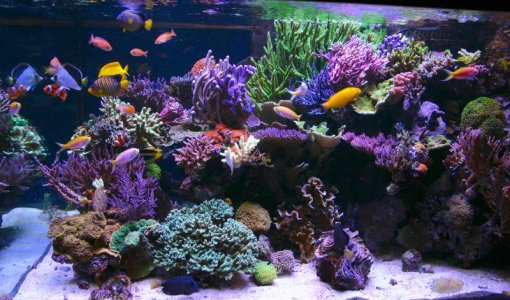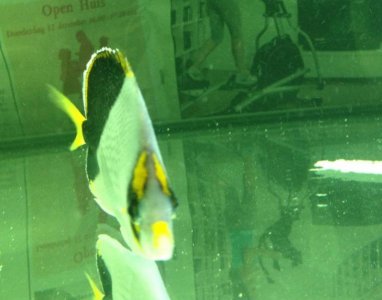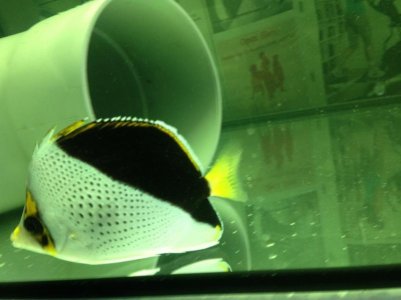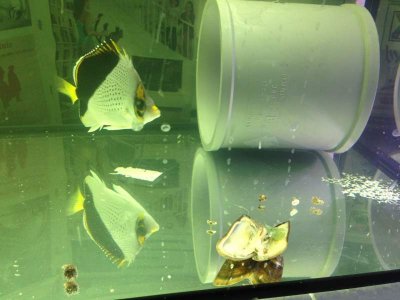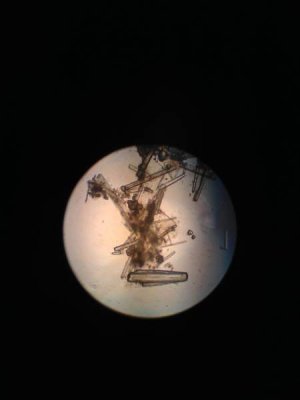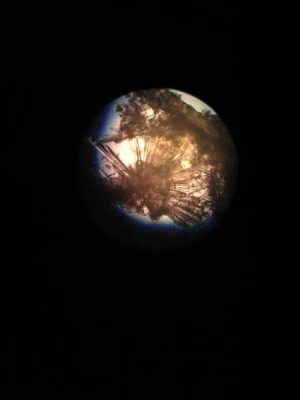Tanu
Member
Dear all, I hope you can help me curing my fish.
My tinker's butterfly is ill. I bought it 6 months ago and it has done very well the first 6 months. Since it stopped eating last week I decided I should treat for Cryptocarion. I set up a small hospital tank using water from the aquarium and I started treating with a mild dose of malachite green, methylene blue and formalin (commercially available fish medicine here sold under the brand name Femsee), I stuck to these for 2 days. Yesterday I switched to copper and Furaltadone (broad-spectrum antibiotic, nitrofuran derative). I choose the copper because of what I have read both on websites such as these and based on the book by G. Bassleer about fish diseases. The Furaltadone was used because my LFS advised me to do so as he felt there might be secondary infections. This LFS mostly knows what they are talking about. I have a Salifert copper test kit and as I read I should gradually increase the level of the copper I started with about 0,15 mg/l.
I check nitrites and ammonium daily, so far both are undetectable. Daily I replace 50% of the water with water from the reef aquarium, I top up removed medication.
The fish still does not eat. Of course, the main goal is to get the fish completely healthy again, but I feel I should get it to eating as well. Of course, the fish probably does not eat because it is ill, but the fact it does not eat does not help its immune system.
So my main questions are:
- am I doing everything right?
- when could I expect the fish to eat again?
All suggestions are more than welcome.
I filled in the questionnaire from the stickies as well.
Thanks in advance, also on behalf of my fish
1. How old is this aquarium?
Set up in 2006. See the picture I have attached.
2. If less than six months old, what is ammonia level?
-
3. What is SG of this aquarium? How measured?
1.024, spindle
4. When was the last fish added to this aquarium?
August 2013, 5 small Anthias cooperi which all do very well.
5. Was it quarantined? If so, how? And how long? Was it prophylactically treated? How?
Kept in a separate perforated box in the tank for about 2 weeks. Prophylactically treated in a FW-bath with praziquantel for 25 minutes.
6. If you are using a copper based medication, which one? How often do you measure level? When?
See below.
7. If you are using hyposalinity, how did you calibrate your refractometer?
-
8. Please describe in detail, the appearance of the fish? If there is one or more pimples, are they lumpy? What color?
Fish looks ok, but an experienced keeper could see there was 'something' wrong when the fish was still in the display tank. It has had a few spots earlier, but nothing serious. The amount of spots seems to have increased a bit, but, even worse: the fish quit eating last week so it was moved to a hospital tank on Jan. 4th. I have attached two pictures of the fish, the one from the front shows the skin's condition best. That picture is not completely clear, but especially on the black areas of the fish, the spots are visible quite well.


9. Please describe the behavior of the fish as best you can. Is it acting reclusive? Is it always up towards the top of the aquarium? Is it avoiding light? How active is the fish?
When still in the display tank, the fish used to be very active and ate nearly anything from between my fingers. Last week the fish quit eating and I did not get it to eat, I tried lots of food without any luck. When the fish quit eating, it went to the cleaner goby and cleaner shrimp more often and was less often swimming in the visible area of the aquarium.
10. Is the fish eating? What?
No, see above. There are some live mysid shrimp, some bigger (but small enough for him) other shrimp and a clip of seaweed (which he used to like) but he does not touch anything.

My tinker's butterfly is ill. I bought it 6 months ago and it has done very well the first 6 months. Since it stopped eating last week I decided I should treat for Cryptocarion. I set up a small hospital tank using water from the aquarium and I started treating with a mild dose of malachite green, methylene blue and formalin (commercially available fish medicine here sold under the brand name Femsee), I stuck to these for 2 days. Yesterday I switched to copper and Furaltadone (broad-spectrum antibiotic, nitrofuran derative). I choose the copper because of what I have read both on websites such as these and based on the book by G. Bassleer about fish diseases. The Furaltadone was used because my LFS advised me to do so as he felt there might be secondary infections. This LFS mostly knows what they are talking about. I have a Salifert copper test kit and as I read I should gradually increase the level of the copper I started with about 0,15 mg/l.
I check nitrites and ammonium daily, so far both are undetectable. Daily I replace 50% of the water with water from the reef aquarium, I top up removed medication.
The fish still does not eat. Of course, the main goal is to get the fish completely healthy again, but I feel I should get it to eating as well. Of course, the fish probably does not eat because it is ill, but the fact it does not eat does not help its immune system.
So my main questions are:
- am I doing everything right?
- when could I expect the fish to eat again?
All suggestions are more than welcome.
I filled in the questionnaire from the stickies as well.
Thanks in advance, also on behalf of my fish
1. How old is this aquarium?
Set up in 2006. See the picture I have attached.
2. If less than six months old, what is ammonia level?
-
3. What is SG of this aquarium? How measured?
1.024, spindle
4. When was the last fish added to this aquarium?
August 2013, 5 small Anthias cooperi which all do very well.
5. Was it quarantined? If so, how? And how long? Was it prophylactically treated? How?
Kept in a separate perforated box in the tank for about 2 weeks. Prophylactically treated in a FW-bath with praziquantel for 25 minutes.
6. If you are using a copper based medication, which one? How often do you measure level? When?
See below.
7. If you are using hyposalinity, how did you calibrate your refractometer?
-
8. Please describe in detail, the appearance of the fish? If there is one or more pimples, are they lumpy? What color?
Fish looks ok, but an experienced keeper could see there was 'something' wrong when the fish was still in the display tank. It has had a few spots earlier, but nothing serious. The amount of spots seems to have increased a bit, but, even worse: the fish quit eating last week so it was moved to a hospital tank on Jan. 4th. I have attached two pictures of the fish, the one from the front shows the skin's condition best. That picture is not completely clear, but especially on the black areas of the fish, the spots are visible quite well.
9. Please describe the behavior of the fish as best you can. Is it acting reclusive? Is it always up towards the top of the aquarium? Is it avoiding light? How active is the fish?
When still in the display tank, the fish used to be very active and ate nearly anything from between my fingers. Last week the fish quit eating and I did not get it to eat, I tried lots of food without any luck. When the fish quit eating, it went to the cleaner goby and cleaner shrimp more often and was less often swimming in the visible area of the aquarium.
10. Is the fish eating? What?
No, see above. There are some live mysid shrimp, some bigger (but small enough for him) other shrimp and a clip of seaweed (which he used to like) but he does not touch anything.

